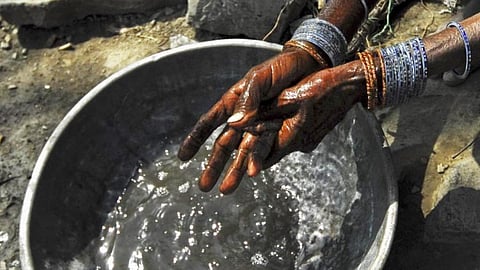
- Topics
- Feature
- Opportunities & Events
- Data
- Hindi Portal
- Topics
- Feature
- Opportunities & Events
- Data
- Hindi Portal

Manual scavenging has been glorified since the time of Mahatma Gandhi. It hasn’t changed now with prime minister Narendra Modi describing it as an “experience in spirituality”. Manual scavenging is dehumanising. And despite the laws created to abolish it, the news of manual scavenging and manual scavengers dying in sewers and septic tanks are not unheard of. The article, Clean India, unclean Indians: Beyond the Bhim Yatra, published in Economic and Political Weekly dated June 25, 2016, deals with these issues and more in detail.
Manual scavenging continues to draw the attention of policymakers, judiciary, executive, civil society organisations and the media. In reality, however, it is still flourishing in urban India. Most people who make a living as sanitary workers in the cities belong to the Balmiki caste which has been doing this job traditionally. The article says that one of the major achievements of the colonial administration of the past and the ruling political parties of the present is moulding this community into accepting scavenging as their tradition. In fact, the state is the largest agency which employs and pays over a million scavengers.
With their new identity of safai karamchari given to them by the state, it may appear that they have earned a secular status in the society. That’s not all, social scientists call them ‘professionals of the city’ and the Delhi Municipal Corporation has named them swasthya kamgar (the health workers). But the reality doesn’t do any justice to these seemingly respectable identities.
A number of organisations like National Commission for Safai Karamcharis and media organisations working at the grassroot level have reported that in India, the state is the biggest offender in maintaining their status quo. The article argues that urbanisation has made the members of the marginal castes more closely identifiable with the scavenging occupation and the local authorities perceive scavengers--a majority of them, women--as indispensable functionaries of the state.
Traditionally, the marginal castes were assigned all the jobs perceived as unclean or dirty, such as the disposal of sewage and animal carcasses, and were viewed as unworthy of even being touched. Although, caste is not openly discussed now, urban scavengers continue to be discriminated as their ‘unclean work’ is identified with their caste.
Social discrimination and economic exploitation of people from the lower castes continue in urban settings, but in different forms, says the article. For example, residential segregation based on caste is the most visible form of caste-based exclusion. Housing facilities provided by the state and other institutions to the marginal castes employed as sanitary workers have reinforced the caste system.
The integration of sanitary workers in the upper caste residential localities is still rare. Similarly, though physical touch or sitting together for a cup of tea is no more a taboo but it is very rarely that the marginal caste would get an invitation to a function at an upper caste household and any form of family ties are frowned upon.
The 125th birth centenary of social reformer B. R. Ambedkar on April 14, 2016 witnessed the manual scavengers taking to the streets in a country-wide protest called Bhim Yatra that went on for 125 days, passing through 500 districts in 30 states. This was organised to direct the nation’s attention to the plight of manual scavengers and to emphasise the need to look beyond their occupations and accept them as part of the society.
The article ends by saying that there are thousands of such men and women in the country dreaming of a better life and yearning respect and dignity. It is time the Swachh Bharat campaign addressed the heart of the issue and acknowledged that manual scavenging is a primitive occupation that’s not just unclean but hazardous, too.
A copy of the paper can be downloaded from below: